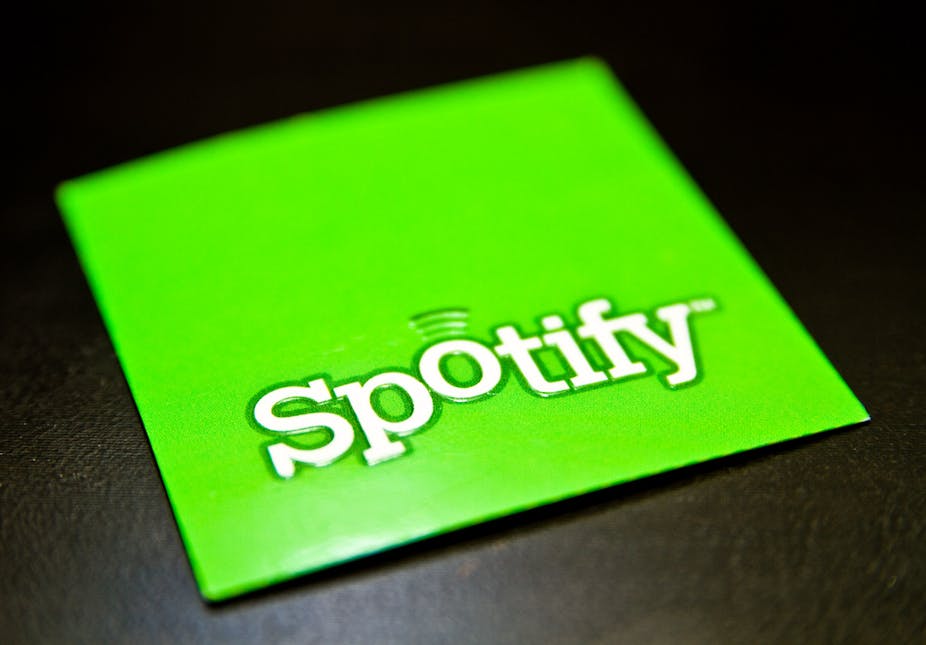For the first time, streaming is to be included in the UK singles chart. This announcement was followed by reports that digital music sales now account for more than half the UK record industry’s income. But the royalties gleaned from streaming are often the subject of much complaint, most recently with musician Zoe Keating’s publication of the breakdown of her income last year, 92% of which came from sales – US$75,341 – with only US$6,380 coming from streaming services. It is obvious that the music industry is swiftly changing, but the wider effects this may have are unclear.
Sweden, as the home of Spotify, is ahead of the UK in the digital music world. We included streaming in our charts in September 2013, and internet-driven revenue – downloads and streaming – accounts for about 70% of the market here. So looking at the changes that have been occurring here may give some indication of the UK’s future.
Internet royalties were introduced in Sweden in 2003 but remained extremely small until Spotify made its breakthrough a few years ago. From 2010, the royalty revenues from music downloaded or streamed from the internet grew significantly. The statistics for 2011 showed a 70% increase of this kind of royalty income from the year before.
And the positive trend for internet driven income continues. 2012 statistics show how the sale of physical and downloaded formats fell while streamed music increased. Total revenues from recorded music amounted to 1.6 billion Swedish Krona (currently approximately US $3.7m), of which streamed sales accounted for 62%, physical sales 32% and downloaded sales 5%. In the UK, streaming only currently accounts for around 10% of consumer revenues from recorded music.
In 2013 the total income from record sales rose by 5% despite the fall in physical record sales and a 22% fall in income from downloaded music. So in Sweden, streaming is driving a boost in revenues.
This radical trend is clearly related to the success of Spotify and other similar platforms. Mikael Strömberg has argued that Spotify has probably managed to absorb a lot of illegal file-sharing, creating a pool of new potential revenue. This is not to deny that the start-up process for Spotify was difficult. When the domestically successful middle-aged singer-songwriter Magnus Uggla saw his first six-month royalty from Spotify, he furiously blogged that it was “what a semi-mediocre busker could attract in one day”.
The situation has improved during recent years and both domestic and international artists are now better compensated. But the most significant result of this, I think, is the opening of the market to new talent.
In 2012 the list of most played singles on Spotify in Sweden was topped in periods by artists and groups which were unknown to a larger Swedish audience. Den svenska björnstammen (The Swedish bear population) made #1 as did Ansiktet (The Face) with its track Äckligt (Disgusting). The equally little known Gothenburg-based reggae artist Kapten Röd (Captain Red) made the top of Spotify Sweden’s most streamed albums list in 2011 with his first album. The obvious conclusion is that the very youngest listeners were the first to take on the new technology.
An important Spotify feature is that files can be easily uploaded not only from the major record companies but also from independent companies and even individuals. There is now a much lessened need for major record companies and other intermediaries if one wants to reach a large audience. Now, through streaming sites, more money can reach smaller artists directly.
The official list of most sold single tracks in 2013 includes both music that bought in physical CD format as well as streamed songs. It bears witness to the importance of Spotify, resembling the Spotify 2013 list to a very large extent.
When it comes to albums the situation is radically different. Of the five most streamed albums on Spotify in Sweden in 2013 only two were also on the official top 20 list of most sold albums. Artists like Gyllene Tider or Agneta Fältskog, who appear on the top 20 CD list, appeal to a more mature audience who cherish the feel of the CD sleeve.
But this generation now have a hard time trying to motivate their children to buy an album with tracks which they are not sure they will appreciate. Some even claim that the word “album” is unknown among contemporary Swedish teenagers.
What Sweden shows is that eventually streaming revenue will be where artists glean the most income, even if this is not evident now. And this opens up the market to a vast number of artists. You no longer need to have a record contract to be making money in music, and this is a trend that will only continue to grow.

